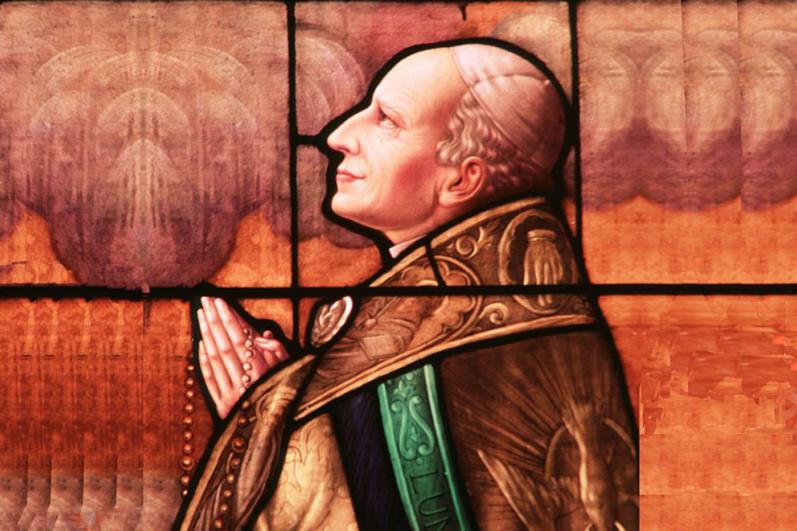Pope Leo XIII and contemporary Catholic contentions
Given everything else going on these days, it may seem strange that a 129-year-old encyclical by Pope Leo XIII, founding father of modern Catholic social doctrine, should have become a shuttlecock in the volleys exchanged by conservative American legal theorists and commentators. But there it is. And it's imperative that the record about Leo XIII's political theory be clarified before Professor Adrian Vermeule of the Harvard Law School misrepresents the great Leo further -- and Vermeule's critics continue to make matters worse by swallowing the misrepresentation.
Professor Vermeule is a prominent voice among Catholic "integralists" whose program includes a critique of the late Justice Antonin Scalia's "originalist" approach to constitutional interpretation, which they judge morally hollow. Responding to Vermeule in a July 24 article in The Wall Street Journal, two defenders of Scalia's position, David Rivkin and Andrew Grossman, concluded their argument in these terms:
". . . Mr. Vermeule takes inspiration from an 1892 encyclical in which Pope Leo XIII 'urged French Catholics to rally to the Third French Republic in order to transform it from within.' He imagines American Catholics will eventually co-opt 'executive-type bureaucracies' to effect a 'restoration of Christendom.' Such a ralliement seems far less likely in the U.S. than in France, but it failed there, too."
That, at least, is true: Leo XIII's call to French Catholics to "rally" to the Third Republic failed. But Professor Vermeule misrepresents what Leo XIII was doing in the 1892 encyclical "Au Milieu des Sollicitudes" (Amidst the Cares of the Universal Church). And by accepting that misrepresentation at face value, my friend David Rivkin and his colleague Andrew Grossman gave tacit warrant to the notion that serious U.S. Catholics are bent on a "restoration of Christendom" in the United States by means of a Catholic takeover of the administrative state. If I may borrow a phrase from a heathen, this is all nonsense upon stilts.
Let's go to the videotape.
In the late 19th century, French Catholicism was fractured and evangelically disempowered because of an ongoing, bitter conflict between Catholics who dreamed and schemed about restoring the French monarchy and a state-sponsored Church, and Catholics who knew that that dream was a fantasy and that those schemes were impeding the Church's efforts to do the works of education and charity in France. By calling French Catholics to "rally" to the Third French Republic, Leo XIII was trying to put an end to this circular firing squad, asking French Catholics to stop litigating the results of the Revolution of 1789 and to get on with being salt and light in modern society, bringing Gospel truths to bear in French public life -- which badly needed them.
Leo, who knew that the fratricide between French Catholic royalists and French Catholic republicans was sapping the Church of spiritual energy, was also the shrewdest pope in centuries when it came to reading the political signs of the times. So he understood that French Catholic royalists were perversely confirming the spurious claims of those Third Republic hyper-secularists who took their cues from the worst of the French Revolution's anticlericalism. And he wanted that to stop.
Leo's encyclical made several other key points. Charting a Catholic course through the brambles of political modernity, Leo taught that there could be different types of legitimate political regimes: monarchies, democratic republics, and so forth. Leo also knew that a republic could be good or bad. Republics could foster human flourishing and social solidarity, and republics could fall prey to grave social evils. The key to a well-ordered republic was its civil society: those networks of natural associations (like the family) and voluntary associations (like the Church, trade unions, businesses, and charitable organizations) where the habits of mind and heart necessary for making the machinery of a republic work properly are formed. In Leo's view, the Church's role was to help shape that kind of vibrant civil society and it ought to demand of hyper-secularists the right to do so freely and publicly.
But the Church did not seek to govern the state, Pope Leo insisted. Indeed, "Au milieu des Sollicitudes" specifically stated that any notion of a Catholic "ambition of securing to the Church the political domination of the state" was a "craftily constructed calumny." Pondering that Leonine teaching, Professor Vermeule and his fellow-integralists might consider whether they're reprising the 19th-century French royalist mistakes that ultimately led some French Catholics to embrace the authoritarian Vichy regime during World War II. By the same token, conservative legal commentators should not assume that today's Catholic integralists are representing Leo XIII and post-Leonine Catholic social doctrine accurately; they are not.
- George Weigel is Distinguished Senior Fellow of the Ethics and Public Policy Center in Washington, D.C.



















